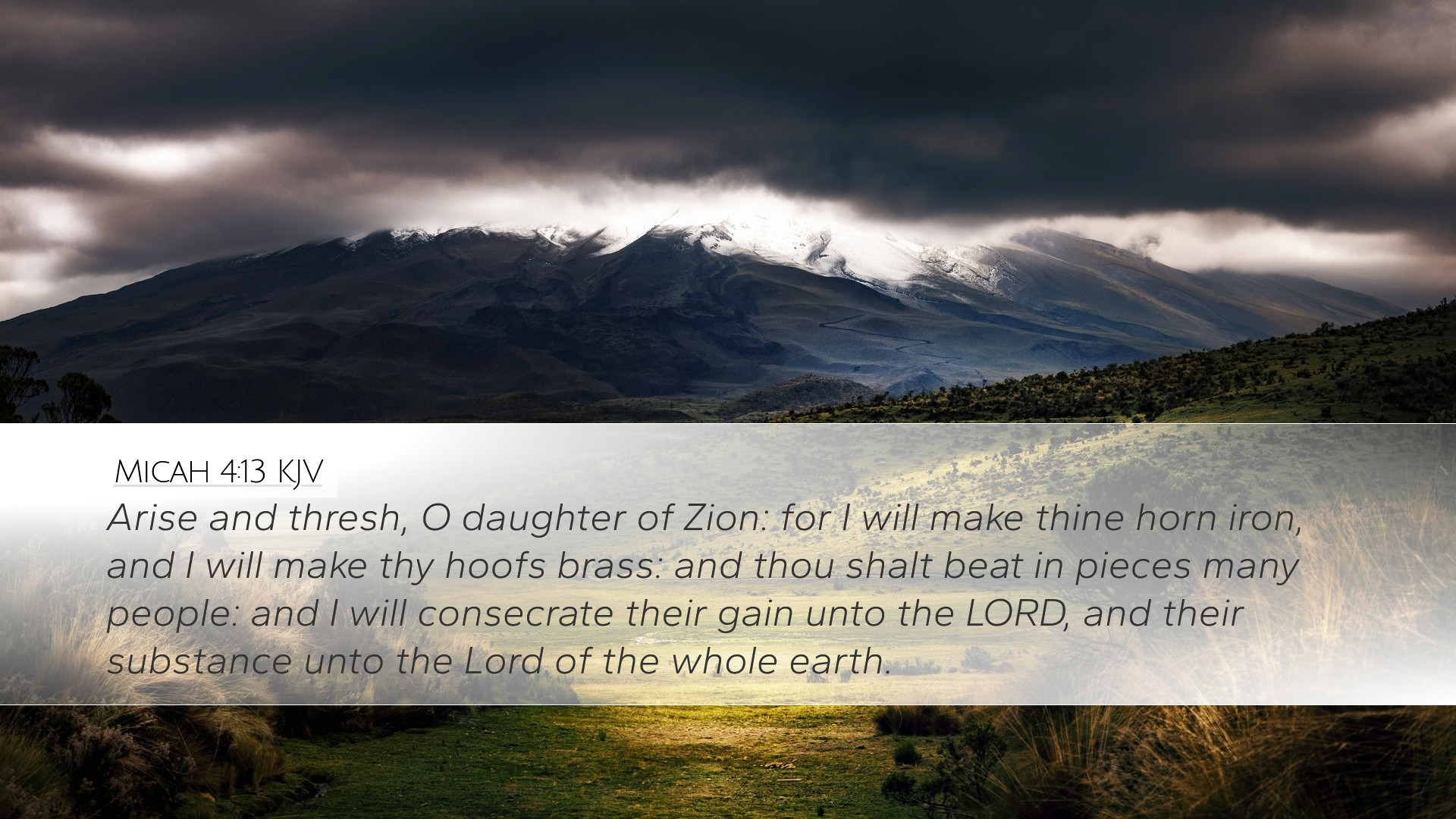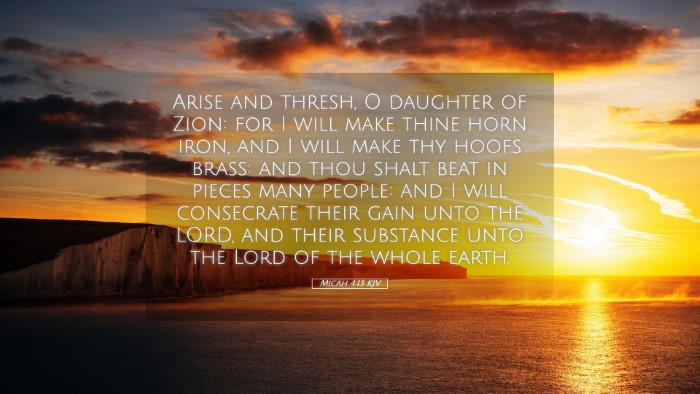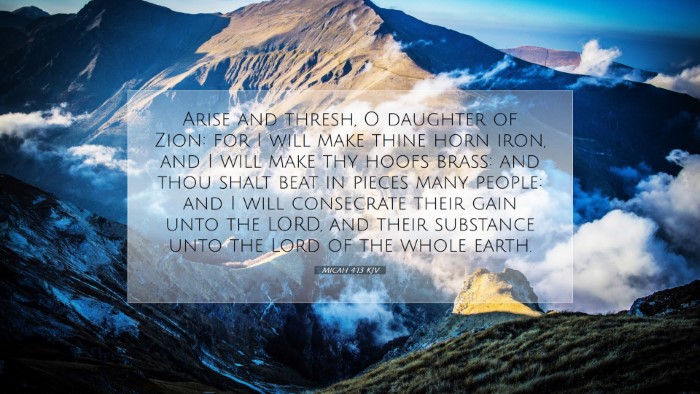Old Testament
Genesis Exodus Leviticus Numbers Deuteronomy Joshua Judges Ruth 1 Samuel 2 Samuel 1 Kings 2 Kings 1 Chronicles 2 Chronicles Ezra Nehemiah Esther Job Psalms Proverbs Ecclesiastes Song of Solomon Isaiah Jeremiah Lamentations Ezekiel Daniel Hosea Joel Amos Obadiah Jonah Micah Nahum Habakkuk Zephaniah Haggai Zechariah MalachiMicah 4:13
Micah 4:13 KJV
Arise and thresh, O daughter of Zion: for I will make thine horn iron, and I will make thy hoofs brass: and thou shalt beat in pieces many people: and I will consecrate their gain unto the LORD, and their substance unto the Lord of the whole earth.
Micah 4:13 Bible Commentary
Commentary on Micah 4:13
Verse: "Arise and thresh, O daughter of Zion: for I will make thine horn iron, and I will make thy hooves brass: and thou shalt beat in pieces many people: and I will consecrate their gain unto the Lord, and their substance unto the Lord of the whole earth." (Micah 4:13)
This verse is a climactic proclamation from the prophet Micah, situated within a broader context of hope and restoration for Israel. In this commentary, we will explore its implications and theological significance through the lenses of various public domain commentaries.
The Call to Action: "Arise and Thresh"
The command to “arise and thresh” invites the “daughter of Zion” (representative of God’s people or Jerusalem) into a posture of readiness and active engagement. Public domain commentaries suggest that this action symbolizes a necessary awakening to fulfill their divine purpose.
- Matthew Henry: He emphasizes that the command reflects a call for Israel to rise up against her oppressors, indicative of God's empowering presence. Henry interprets this as a call to spiritual vigor—encouraging believers to step forth and take hold of the promised victory.
- Albert Barnes: Barnes notes that the act of threshing metaphorically represents the judgment of nations. It reflects God's intention to use His people as instruments of divine justice against enemies.
- Adam Clarke: Clarke adds that the call signifies the empowerment of Israel to execute God’s will in the face of adversity, underscoring their restoration from a state of humiliation to one of victory.
Divine Empowerment: "I Will Make Thine Horn Iron"
The imagery of iron horns and brass hooves serves as potent symbols of strength and invincibility. The horn is a biblical symbol of power, and the promise of being made iron signifies a divine endowment of resilience and might.
- Matthew Henry: He interprets this as a metaphorical strengthening of Israel, indicating God’s guarantee that they would not be vulnerable. The iron horn represents authority and the capacity to overcome.
- Albert Barnes: Barnes elucidates that the strength represented by the iron horns indicates a time when Israel will be able to trample down her foes effectively, contrasting their previous states of vulnerability.
- Adam Clarke: Clarke highlights the significance of brass hooves, noting they represent a solid foundation for divine action. He suggests this implies a future judgment, where the strength of Israel would yield great triumphs against nations.
Judgment and Just Reward: "Beat in Pieces Many People"
The prophetic declaration that they will "beat in pieces many people" is a metaphor for the ultimate victory over oppressors. There’s a dual focus here: a vindication of God’s people and a stark warning to those who stand against His will.
- Matthew Henry: He conveys that the "many people" refers to the nations opposing Israel. In a historical context, this could relate to surrounding enemies who would experience God’s judgment through Israel’s restored strength.
- Albert Barnes: Barnes points out that such language should be understood expressively—indicating that the Lord would avenge His people and reward them for their suffering.
- Adam Clarke: Clarke interprets "beating in pieces" as an indication of dominance; he warns that while God uses Israel as a means, it is ultimately about God’s righteousness being enacted in the world.
Consecration and Offering: "I Will Consecrate Their Gain unto the Lord"
The latter part of the verse deals with consecration—it speaks to the offerings that will be made from the spoils of victory. This is a call to holiness and acknowledgment that all victories belong ultimately to the Lord.
- Matthew Henry: His commentary reinforces the idea that the spoils will not just serve the people's interests but will be dedicated to God, illustrating a proper heart posture in receiving blessings from God.
- Albert Barnes: Barnes emphasizes the importance of recognizing divine providence in the gains acquired through warfare, noting that God demands a share of the gains to signify gratitude and for His glory.
- Adam Clarke: Clarke expounds on the idea that this act of consecration represents a theologically rich concept where the people must see themselves as earthly stewards of God’s coming kingdom.
Theology of the Whole Earth: "Lord of the Whole Earth"
Finishing with the title “Lord of the whole earth” not only signifies God’s sovereignty but also reveals His universal authority. This has implications for understanding the nature of God’s dominion.
- Matthew Henry: He affirms that this title asserts God’s ultimate power over all creation, emphasizing that though Israel is favored, His will encompasses all nations.
- Albert Barnes: Barnes suggests this serves as a reminder that God’s plans are not limited; rather, His purposes are realized in the grand scope of history and nations.
- Adam Clarke: Clarke reflects on this global aspect, arguing that the acknowledgment of God as Lord of all should compel believers to live with purpose and declaration of His glory among all peoples.
Conclusion
Micah 4:13 serves as a profound reminder of God’s promise to restore His people and establish His dominion through them. The imagery of strength and judgment, coupled with the obligation of consecration, provides both a challenge and a hope for God's people. Through the voices of Matthew Henry, Albert Barnes, and Adam Clarke, we glean significant insights that invite pastors, students, theologians, and scholars to consider the breadth of God's action and intention for His creation.
As we apply these interpretations, may we arise in faith and engage in the calling to witness and embody the transformative power God has promised to His people.


